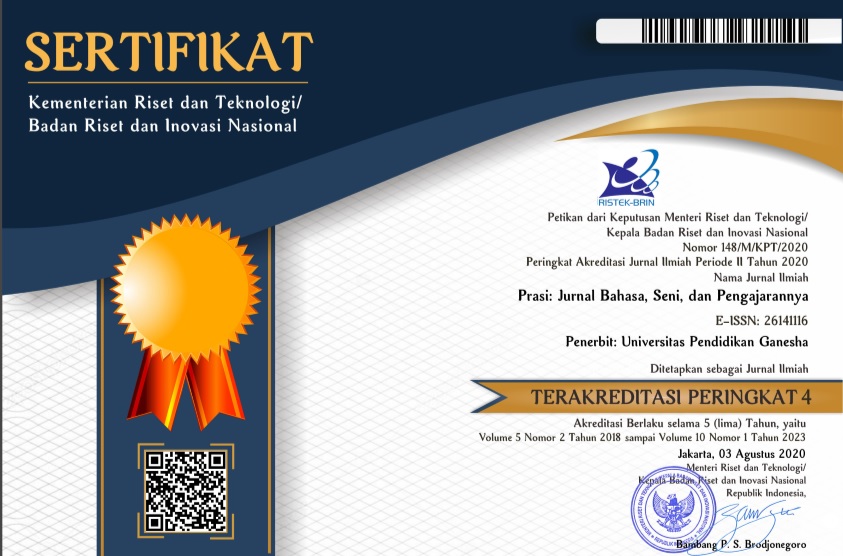EKSISTENSI BAHASA INDONESIA SEBAGAI BAHASA NASIONAL DAN PERKEMBANGANNYA DI ERA GLOBALISASI
DOI:
https://doi.org/10.23887/prasi.v9i18.8943Abstract
Indonesian was born from Melayu language which used to be a lingua franca language, that is, the inter-island language of trading in Nusantara. It was then officially inaugurated as a language of unity in Sumpah Pemuda [Youth Pledge]. Due to this fact, on October 28, 1928 Indonesian was decided as the language of unity, and in 1945 was ratified as the national language. An issue emerging in the existence of Indonesian is how to maintain its existence. The problem is not only about its existence, but also whether or not local languages in the country can enrich the vocabulary and terms of Indonesian. Another problem is how the potential of Indonesian is in this globalization era. The existence of Indonesian, besides being influenced by the consistency of its use, is also supported by its ability in expressing the existing new phenomena. Therefore, its development is very much dependent on how successful the creation of new vocabulary and terms in the language is. Indonesian is starting to go global due to its characteristics of being open and democratic. The present and future development is not only limited to structure and language, but also goes further to uncover new problems experienced by human beings in the process of change in various aspects of life.
Key words: existence, national language, development in globalization era
Downloads
Published
Issue
Section
License
Authors who publish with Prasi agree to the following terms:- Authors retain copyright and grant the journal the right of first publication with the work simultaneously licensed under a Creative Commons Attribution License (CC BY-SA 4.0) that allows others to share the work with an acknowledgment of the work's authorship and initial publication in this journal
- Authors are able to enter into separate, additional contractual arrangements for the non-exclusive distribution of the journal's published version of the work (e.g., post it to an institutional repository or publish it in a book), with an acknowledgment of its initial publication in this journal.
- Authors are permitted and encouraged to post their work online (e.g., in institutional repositories or on their website) prior to and during the submission process, as it can lead to productive exchanges, as well as earlier and greater citation of published work. (See The Effect of Open Access)


.png)
.png)









